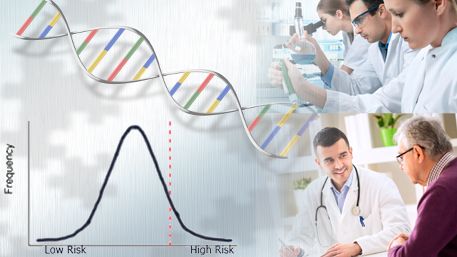Genomics and Precision Health Blog – Archive Posts
Can a Healthy Lifestyle Reduce Your Risk of Dementia Regardless of Your Genes?

A large retrospective, cohort study found that a healthy lifestyle is associated with a lower risk for dementia among people considered at high genetic risk. An active lifestyle, which includes a nutritious diet, limited alcohol, and not smoking, has long been associated with reduced risk of cancer and heart disease. In the last ten years, Read More >
Posted on byWhy should early career public health researchers pay attention to precision medicine?

In a recent commentary published in the American Journal of Public Health, I had the privilege of working with a group of early career investigators to begin a conversation about the impact that the debate between the utility of precision medicine and public health approaches is having as we begin our research careers. To begin, let’s Read More >
Posted on byThe use of polygenic risk scores in clinical practice can exacerbate health disparities in ethnic and minority populations

This blog is a summary of our recent commentary on polygenic risk scores (PRS). PRS provide a rapidly emerging example of precision medicine and are based on multiple gene variants that each have weak associations with disease risks, but collectively may enhance disease predictive value in the population. The added value of PRS is unclear Read More >
Posted on by 1 CommentCan Big Data Science Deliver Precision Public Health?

This blog is a quick summary of our recent paper in Public Health Genomics. Increasingly, a large volume of health and non-health related data from multiple sources is becoming available that has the potential to drive health related discoveries and implementation. The term “big data” is often used as a buzzword to refer to large Read More >
Posted on byIntroducing the CDC Tier-Classified Guidelines Database

Over the last several years, OPHG has hosted a “Tier Table” database of genomic applications (i.e., clinical scenarios involving genomic testing) sorted into one of three tiers using a method described in Clinical Pharmacology and Therapeutics, 2014. The purpose of creating the database was to help organize evidence (such as recommendation statements contained in guidelines, Read More >
Posted on byFrequently Asked Questions about the CDC Tier-Classified Guidelines Database

Over the last several years, OPHG has hosted a “Tier Table” database of genomic applications (i.e., clinical scenarios involving genomic testing) sorted into one of three tiers using a method described in Clinical Pharmacology and Therapeutics, 2014. The Tier Table is being replaced with our new Tier-Classified Guidelines Database, which we hope will promote more Read More >
Posted on byIs it Time to Integrate Polygenic Risk Scores into Clinical Practice? Let’s Do the Science First and Follow the Evidence Wherever it Takes Us!

In case you have not been paying much attention to genomic medicine research or social media coverage, you might have missed a clear uptick in the past couple of years on the value of polygenic risk scores in clinical practice and population screening. (see examples here, here, here, and here) Polygenic risk scores (PRS) summarize Read More >
Posted on by 1 CommentCan Predictive Analytics Drive Implementation Research to Improve Population Health?

To date, research investments have yielded many highly effective health interventions for disease prevention and treatment. Examples include smoking cessation, lipid and blood pressure control as well as diet and physical activity interventions. Yet, many interventions are not being optimally delivered to have public health impact. Implementation research can provide a means to determine optimal Read More >
Posted on byLack of Knowledge of Natural History of New Biomarkers: The Achilles’ Heel of Precision Health!

In Greek mythology, when Achilles was a baby, it was foretold that he would die young. To prevent his death, his mother dipped his body in the River Styx, which was supposed to offer powers of invulnerability. However, as she held the baby by the heel, the heel did not come into contact with the Read More >
Posted on byTime to Keep a Smart Watch on Precision Health

A Science-Based Vision for the Wearable Revolution It is 2022, Juan, 45 years old, is thrilled to purchase a new smartwatch he can afford because it is offered at a discount through a special program with his employer. Juan plans to track his physical activity, heart rate, diet, and sleep. Under the program, Juan also Read More >
Posted on by 2 Comments

